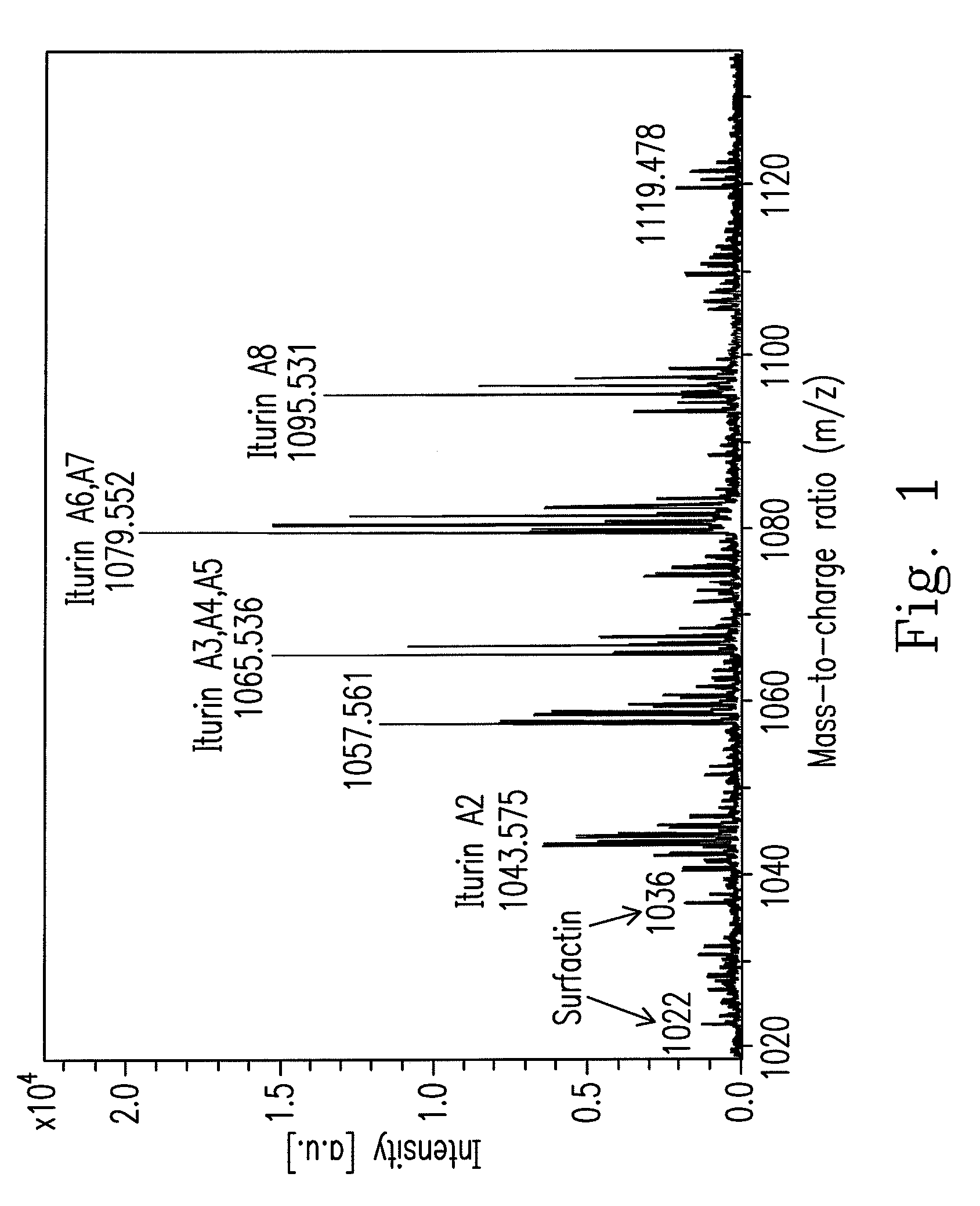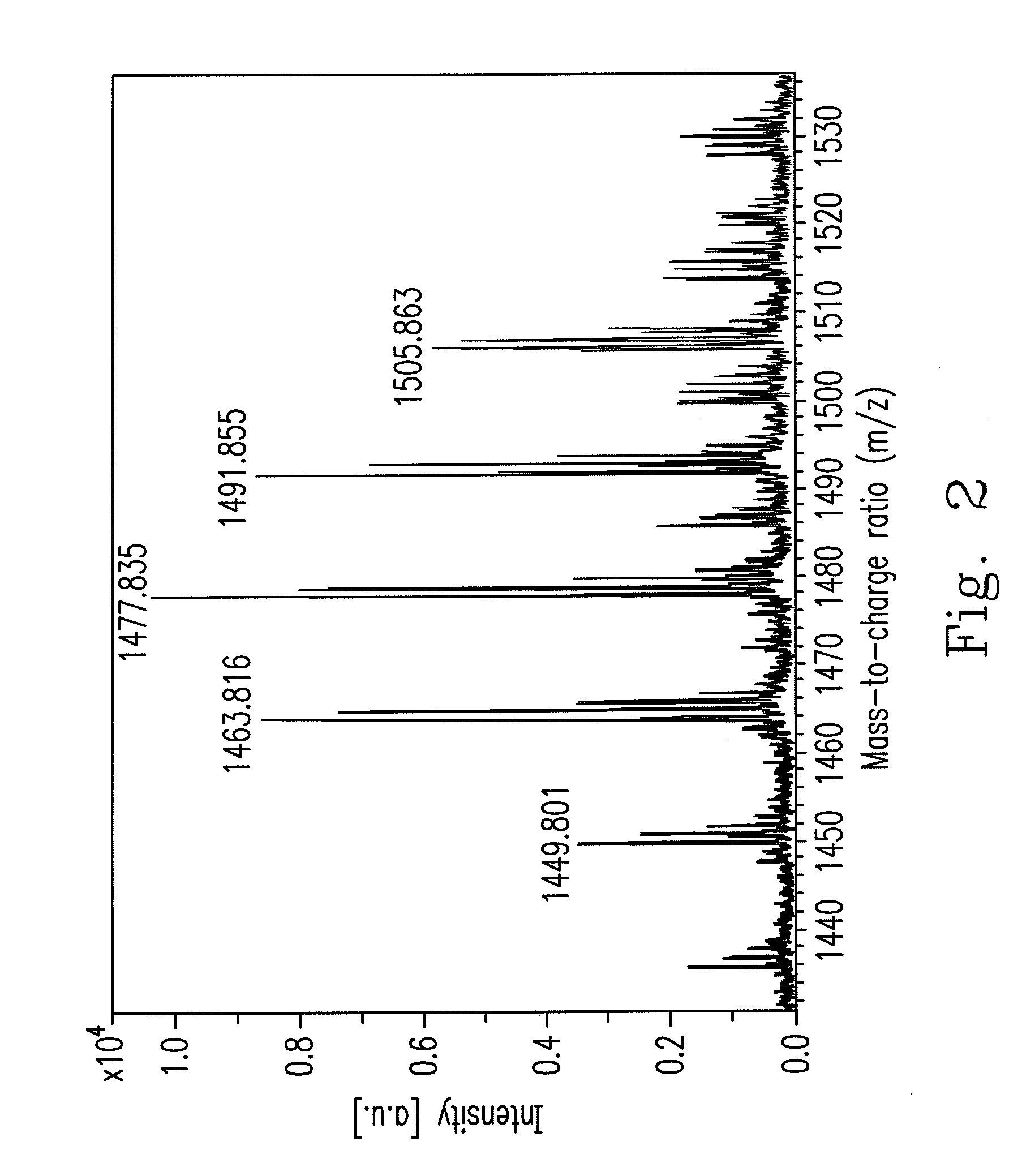Novel strain of bacillus amyloliquefaciens and its use
a technology of bacillus amyloliquefaciens and amyloliquefaciens, which is applied in the field of new strain of bacillus amyloliquefaciens, can solve the problems of increasing the cost, reducing the economic benefit, and increasing the number of microorganisms to decompose various organic macromolecules, so as to inhibit the pathogenic growth of livestock and improve biodegradation
- Summary
- Abstract
- Description
- Claims
- Application Information
AI Technical Summary
Benefits of technology
Problems solved by technology
Method used
Image
Examples
embodiment 1
Characteristics of the Novel Strain of Bacillus amyloliquefaciens Ba-BPD1
[0027]The novel strain of B. amyloliquefaciens Ba-BPD1 was isolated from the soil in Lishan, Taichung County, Taiwan by the inventors, and B. amyloliquefaciens Ba-BPD1 was further incubated, identified and preserved. While incubating B. amyloliquefaciens Ba-BPD1, one single colony thereof was inoculated and incubated overnight in 6 ml of Luria-Bertani (LB, Miller; Difco) broth. The cultured broth was then inoculated in 500 ml of LB broth at a ratio of 1:100, and the inoculated broth was further incubated at 30° C. at 150 rpm for 6 days.
[0028]Furthermore, B. amyloliquefaciens Ba-BPD1 has a specific 16S ribosomal RNA (rRNA) sequence in comparison with other bacteria. The partial 16S rRNA sequence was sequenced and the GenBank accession number was nominated as EF137183, which will be published on the website of the National Center for Biotechnology Information (http: / / www.ncbi.nlm.nih.gov / Genbank / ) on Dec. 31, 200...
embodiment 2
Production of Amylase from B. amyloliquefaciens Ba-BPD1
[0030]In order to prove that B. amyloliquefaciens Ba-BPD1 can produce amylase to hydrolyze starch, an amylase hydrolysis test was performed as follows. A single colony of B. amyloliquefaciens Ba-BPD1 was picked from the nutrient agar (NA) plate and mixed with 50 μl of distilled water to be the bacterial medium. Then, 50 μl of the bacterial medium was dripped on a 1-cm-diameter disc which was further stuck on a yeast extract-soluble starch agar (YSA) plate (containing 1.0% of yeast extract, 1.0% of soluble starch and 1.5% of agar). This YSA plate was incubated at 30° C. for 2 to 3 days. After incubation, 3 to 4 ml of iodine solution (containing 0.3% (w / v) of iodine and 3% (w / v) of potassium iodine) was immersed on the YSA plate. The colony size and the clear zone formation of B. amyloliquefaciens Ba-BPD1 were measured within 5 minutes. The blue-black color shown on the medium means that starch is not hydrolyzed; however, the clea...
embodiment 3
Production of Protease from B. amyloliquefaciens Ba-BPD1
[0032]In order to prove that B. amyloliquefaciens Ba-BPD1 produce protease to hydrolyze protein, an proteolytic test was performed as follows. The bacterial medium of B. amyloliquefaciens Ba-BPD1 was prepared as Embodiment 2. Fifty (50) μl of the bacterial medium thereof was dripped on a 1-cm-diameter disc which was further disposed on a skim milk agar (SMA) plate (containing 1.5% of skim milk, 1.3% of nutrient broth and 1.5% of agar) (Elsheikh et al., 1986). This SMA plate was incubated at 30° C. for 2 to 3 days, and the colony size and the clear zone formation of B. amyloliquefaciens Ba-BPD1 were calculated. The clear zone surrounding the colony means protein in the skim milk is hydrolyzed by the bacterium. It was found that the colony size in diameter and the clear zone in diameter were 1.77 cm and 3.61 cm respectively in triplet.
[0033]Kumar et al. (2008) found that Pseudomonas aeruginosa produce the alkaline protease to hyd...
PUM
| Property | Measurement | Unit |
|---|---|---|
| diameter | aaaaa | aaaaa |
| diameter | aaaaa | aaaaa |
| diameter | aaaaa | aaaaa |
Abstract
Description
Claims
Application Information
 Login to View More
Login to View More - R&D
- Intellectual Property
- Life Sciences
- Materials
- Tech Scout
- Unparalleled Data Quality
- Higher Quality Content
- 60% Fewer Hallucinations
Browse by: Latest US Patents, China's latest patents, Technical Efficacy Thesaurus, Application Domain, Technology Topic, Popular Technical Reports.
© 2025 PatSnap. All rights reserved.Legal|Privacy policy|Modern Slavery Act Transparency Statement|Sitemap|About US| Contact US: help@patsnap.com


